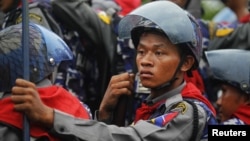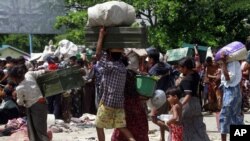Burma's president declared a state of emergency Sunday night for a riot-hit western state, wracked by deadly sectarian violence between Buddhists and Muslims.
Thein Sein warned in a televised address to the nation that if the violence in Rakhine state spreads further, it could put the country's moves toward democracy in danger.
He invoked the emergency measure following three days of violence in Rakhine state between Buddhists and members of the Muslim Rohingya ethnic group, in which at least seven people were killed and hundreds of buildings were set ablaze.
The Burmese leader said that violent attacks fueled by "hatred and revenge based on religion and nationality" could spread to other parts of the country. He said if that happens, the country's stability and peace, democratization process and development, which are in transition right now, could be severely affected.
On Saturday, the Burmese government sent additional security forces to Rakhine, near the border with Bangladesh, to restore peace and established a curfew, after overnight rioting between ethnic Rohingya and local Buddhists.
Tensions have been high in Rakhine since last Sunday, when a Buddhist mob attacked a bus and killed 10 Rohingya, mistakenly believing they were responsible for the recent gang-rape and murder of a Buddhist woman.
Burma, also known as Myanmar, does not consider the Rohingya to be Burmese citizens. According to the United Nations there are about 800,000 ethnic Rohingya in the country's western region.
Burma's government has recently begun implementing political reforms, earning approval from Western nations who had long called for change. State media have released an uncharacteristically large amount of information about last week's violent incidents.
Thein Sein warned in a televised address to the nation that if the violence in Rakhine state spreads further, it could put the country's moves toward democracy in danger.
He invoked the emergency measure following three days of violence in Rakhine state between Buddhists and members of the Muslim Rohingya ethnic group, in which at least seven people were killed and hundreds of buildings were set ablaze.
The Burmese leader said that violent attacks fueled by "hatred and revenge based on religion and nationality" could spread to other parts of the country. He said if that happens, the country's stability and peace, democratization process and development, which are in transition right now, could be severely affected.
On Saturday, the Burmese government sent additional security forces to Rakhine, near the border with Bangladesh, to restore peace and established a curfew, after overnight rioting between ethnic Rohingya and local Buddhists.
Tensions have been high in Rakhine since last Sunday, when a Buddhist mob attacked a bus and killed 10 Rohingya, mistakenly believing they were responsible for the recent gang-rape and murder of a Buddhist woman.
Burma, also known as Myanmar, does not consider the Rohingya to be Burmese citizens. According to the United Nations there are about 800,000 ethnic Rohingya in the country's western region.
Burma's government has recently begun implementing political reforms, earning approval from Western nations who had long called for change. State media have released an uncharacteristically large amount of information about last week's violent incidents.






